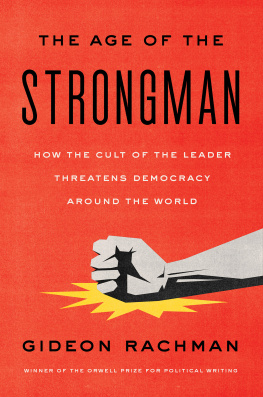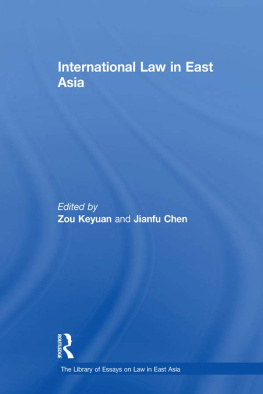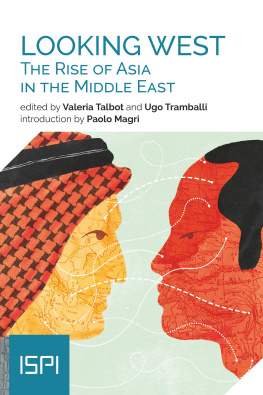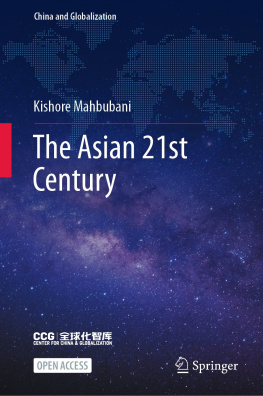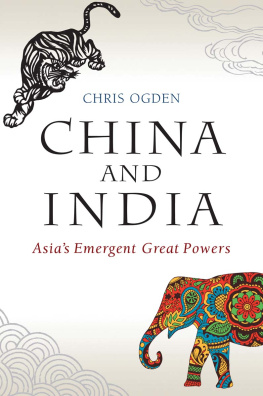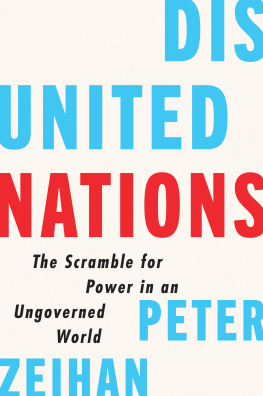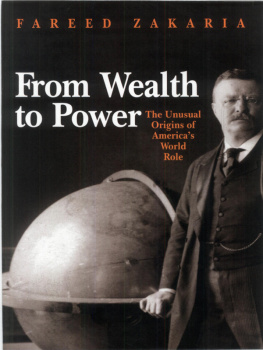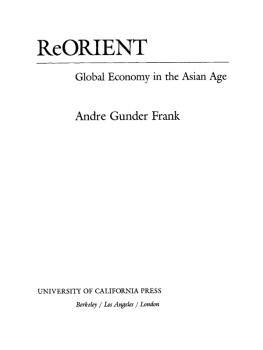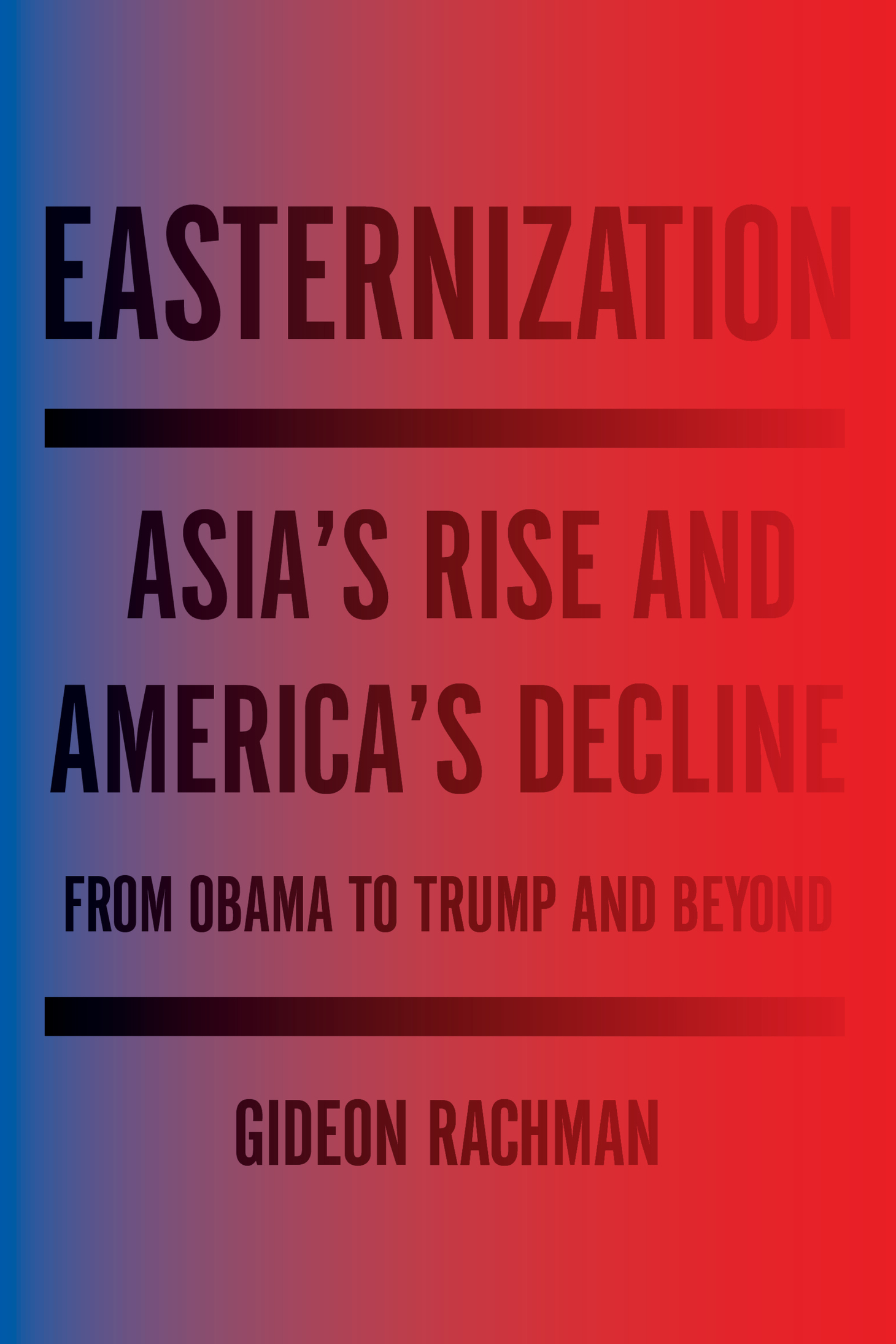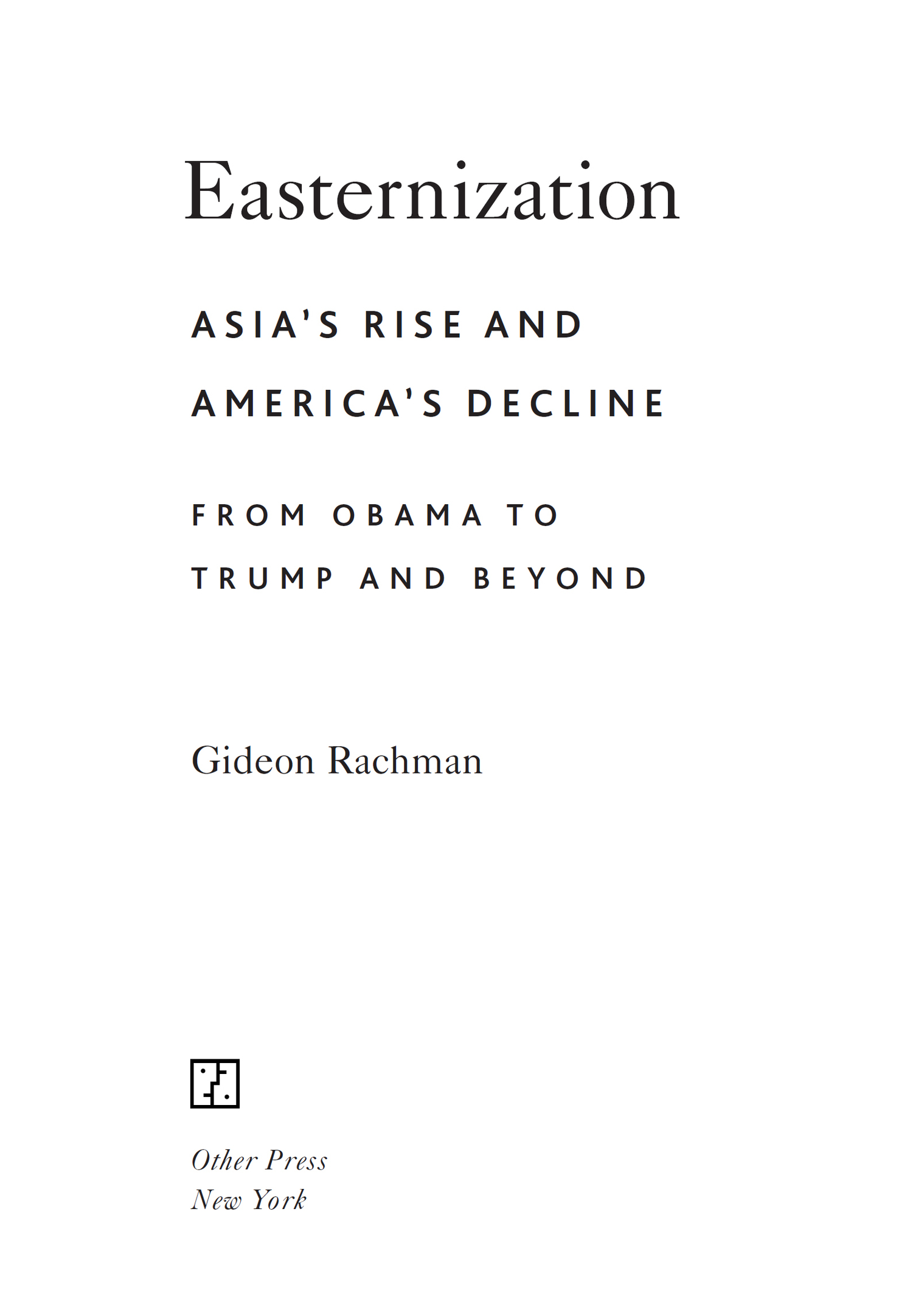Contents
ALSO BY GIDEON RACHMAN
Zero-Sum Future:
American Power
in an Age of Anxiety
Copyright Gideon Rachman 2016
First published in the United Kingdom by The Bodley Head, an imprint of Vintage, a division of The Random House Group Ltd, in 2016.
Production editor: Yvonne E. Crdenas
All rights reserved. No part of this publication may be reproduced or transmitted in any form or by any means, electronic or mechanical, including photocopying, recording, or by any information storage and retrieval system, without written permission from Other Press LLC, except in the case of brief quotations in reviews for inclusion in a magazine, newspaper, or broadcast.
For information write to Other Press LLC, 267 Fifth Avenue, 6th Floor, New York, NY 10016. Or visit our Web site: www.otherpress.com.
The Library of Congress has cataloged the printed edition as follows:
Names: Rachman, Gideon, author.
Title: Easternization : Asias rise and Americas decline from Obama to Trump and beyond / by Gideon Rachman.
Description: New York : Other Press, 2016. | Includes bibliographical references.
Identifiers: LCCN 2016034274 (print) | LCCN 2016035143 (ebook) | ISBN 9781590518519 (hardcover) | ISBN 9781590518526 (e-book)
Subjects: LCSH: AsiaForeign relations. | AsiaForeign relationsUnited States. | United StatesForeign relationsAsia. | East and West.
Classification: LCC JZ 1720 . R 33 2016 (print) | LCC JZ 1720 (ebook) | DDC 355/.03305dc23
LC record available at https://lccn.loc.gov/2016034274
Ebook ISBN9781590518526
v4.1
a
To Natasha, Joe, Nat & Adam
CONTENTS
PREFACE
THE ELECTION OF DONALD TRUMP WAS A REVOLUTIONARY MOMENT . The implications of his presidency for international politics are profound. Ever since 1945, all American presidents have shared a commitment to an international order built around two central pillars. The first is the promotion of international trade. The second is a global security system based on U.S.-led alliances.
Trump threatens to pull down both pillars. The forty-fifth president of the United States is an avowed trade protectionist. And he is also a man who has consistently questioned the value of U.S.-led alliances, calling NATO obsolete and suggesting that Americas defense treaties with Japan and South Korea are bad deals for the United States.
Trumps revolutionary approach to world affairs is underpinned by a discontent with the process that this book calls Easternizationa shift of power and wealth from the West to Asia. By 2014, according to the IMF, China had become the worlds largest economyranked by purchasing power. The United States is now number tworelinquishing the top spot that it had held since the late nineteenth century. In 2009, China had also become the worlds largest merchandise exportera position that the United States had held since the Second World War. Chinas rise is part of a broader shift in economic power to Asia (see ). In pledging to Make America Great Again, Trump implicitly promises to reverse this process of Easternizationrestoring America to its unrivaled position, both in terms of living standards and global power.
The Trump drive to restore American greatness threatens to create conflict between the United States and the rising powers of Asiaabove all, China. Under President Xi Jinping, who came to power in Beijing in 2012, China has also moved in a much more nationalistic direction. Well before Trump pledged to Make America Great Again, Xi had made a similar pitch to nostalgic nationalism, promising a great rejuvenation of the Chinese nation. With Trump and Xi in power in Washington and Beijing, the stage is set for a potential clash between American and Chinese nationalism in the Pacific.
The most obvious potential conflict is over trade. If Trump follows through on his threat to impose swinging tariffs on Chinese goods, he would certainly provoke retaliation. A trade war would ensue, poisoning commercial relations between the first and second largest economies in the world and destabilizing the global economy.
The threat of a real war between the United States and China has also risen following Trumps election. Much of this book is concerned with the slow but steady increase in geopolitical rivalry between America and China during the Obama years. The arrival of Trump in the White House threatens a significant acceleration in this process. The deliberate but careful attempts of the Obama administration to push back against Chinese ambitions in the Asia-Pacific region are likely to be replaced by a new Trump approach that is much more openly confrontational, and more impulsive in style. Even before taking office, the new U.S. president demonstrated his willingness to antagonize Beijingby speaking directly to the president of Taiwan, something that all U.S. presidents have refused to do since the normalization of relations between the United States and China in the 1970s.
If a direct military conflict between China and the United States does break out during the Trump years, the likeliest arena for a clash is the South China Sea. In his confirmation hearings before the U.S. Senate, Rex Tillerson, Trumps new secretary of state, signaled a significant hardening in the American attitude to the artificial islands that China has been building in the South China Sea (see ). Tillerson likened the island building to Russias illegal annexation of Crimea and said that the Trump administration intended to let Beijing know that your access to those islands is not going to be allowed.
Taken at face value, that sounded like a threat to blockade the islands, on which China has been constructing military installations. China would almost certainly attempt to break such a blockade by sea or air. The stage would be set for a modern version of the Cuba missile crisis. The Chinese governments official reaction to the Tillerson statement was restrained. But Chinas state-controlled media was ferocious. The Global Times, a nationalist paper, warned of the possibility of a large-scale war between the United States and China, while the China Daily spoke of a devastating confrontation between China and the U.S. Independent observers had come to similar conclusions. Speaking to me in Davos a couple of days after Tillersons statement, Vivian Balakrishnan, the foreign minister of Singapore, warned that any effort at a U.S. blockade in the South China Sea would lead to a war between the United States and China. The Singaporeans, who maintain close ties to both Washington and Beijing and whose natural style is cautious and technocratic, are not given to hysteria. Many observers wondered whether Tillerson had gone further than intended in his Congressional testimony. His statement seemed to change the traditional U.S. position that its sole concern is freedom of navigation in the South China Sea, and that it takes no position on Chinese sovereignty over the islands. But in the days after Tillersons testimony, the Trump administration did nothing to withdraw or clarify his statements.
A decision by President Trump to confront China over its territorial claims would represent a new development in the presidents thinking, for Trumps most longstanding and profound concerns about Asia are economic. Conventional economic theory has long held that the growing wealth of Asian nations is a good thing for the United States, since it creates larger markets for American companies and cheaper goods for American consumers. But Trump and his advisers emphatically reject this idea. They blame the stagnation of the living standards of American workers on globalismotherwise known as international trade and investment. Stephen K. Bannon, the chief strategist in the Trump White House, argues that, The globalists gutted the American working-class and created a middle-class in Asia. In his view, the increasing wealth of Asiafar from being the mutually advantageous process envisaged by mainstream economicshas impoverished the United States.


